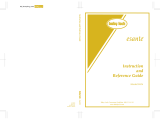
3
PREPARING FOR BOBBIN WORK
Required Materials
■ Bobbin case and bobbin cover
a Bobbin case (gray)
This bobbin case is only for bobbin work. The bobbin
case will allow you to sew with thick thread or narrow
ribbon that cannot be inserted through the eye of the
needle. There is a notch at the location indicated by the
letter “A”.
b Bobbin cover with tabs (for bobbin work)*
There are ribs “B” on the back of the bobbin cover.
The ribs press down on the bobbin so it is not lifted out
when thick thread is being fed from it.
This bobbin cover can also be used with normal
sewing.
* Two bobbin covers may be included, depending on the
country or region where this kit was purchased. Use the
bobbin cover with the same shape as the bobbin cover
included with your machine. The bobbin cover with a
shape different than that included with your machine
cannot be installed on the machine.
■ Lower thread
We recommend the following types of threads for
bobbin work.
* If ribbon is to be used, we recommend that tension not be
applied. Refer to page 6 for more detailed instructions.
■ Upper thread
Sewing machine embroidery thread (polyester thread)
or monofilament (transparent nylon) thread.
If you do not wish for the upper thread to be visible, we
recommend using transparent nylon monofilament
thread or polyester light weight thread (50wt. or above)
that is the same color as the lower thread.
■ Needle
Use a needle appropriate for the upper thread and
fabric being used. For details, refer to your machine’s
Operation Manual.
■ Presser foot
Utility stitches or decorative stitches: Monogramming
foot “N”
Free-motion sewing: Use the free-motion quilting foot
provided with your machine. If you do not have a free-
motion quilting foot, contact your nearest authorized
dealer to purchase one.
No.5 or finer hand embroidery
thread or decorative thread
Flexible woven ribbon
(approx. 2mm (approx. 5/64 inch)
recommended)
Fine embroidery ribbon (silk or
silk-like material) (3.5 mm (approx.
1/8 inch) or less, recommended)
• Do not use thread heavier than No.5 hand
embroidery thread.
• Some threads may not be appropriate for bobbin
work. Be sure to sew trial stitches before sewing on
your project.
• If monogramming foot “N” was not provided with
your machine, use zigzag foot “J”.
• When sewing a pattern described in the machine’s
Operation Manual and the monogramming foot “N”
is recommended, be sure to use this foot, otherwise
the desired results may not be achieved.
Free-motion quilting foot Free-motion open toe
quilting foot “O”




















